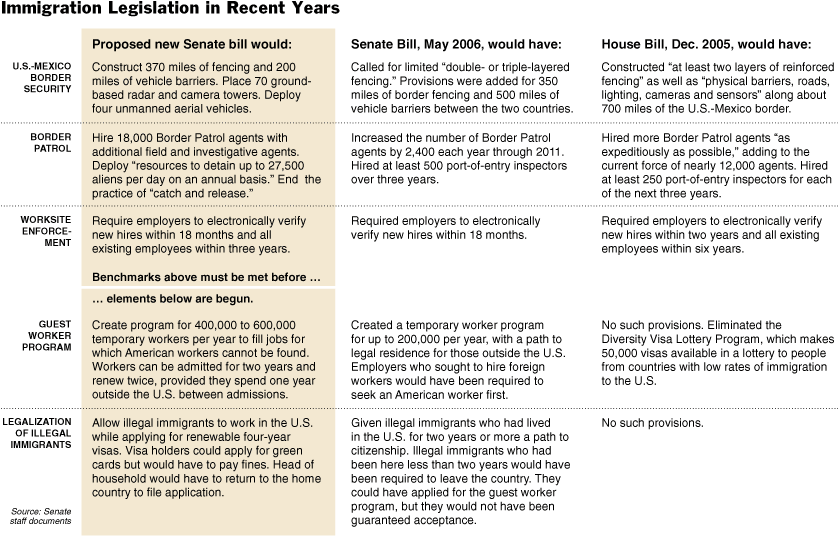| Want to send this page or a link to a friend? Click on mail at the top of this window. |
| More Special Reports |
| Posted Thursday, May 17, 2007 |
Deal Is Reached in Senate on Immigration |
||||
_______________________ |
||||
Measure Offers Legal Status to Millions - |
||||
Prospects Uncertain in the House |
||||
_______________________ |
||||
|
||||
Janie Rose for The New York Times |
||||
| Edward Kennedy was joined by, from left Senators Dianne Feinstein, Mel Martinez, Saxby Chamblis, Johnny Isakson and Ken Salazar for a press conference on the immigration reform bill. |
WASHINGTON, May 17 — Senators from both parties announced an agreement this afternoon on immigration-reform legislation that would bring illegal immigrants and their families “out of the shadows and into the sunshine of American life,” as Senator Edward M. Kennedy put it.
The bill would provide an opportunity “right away” for millions of illegal aliens to correct their status, said Mr. Kennedy, Democrat of Massachusetts. It would emphasize family ties as well as employment skills in weighing how soon immigrants could become legal residents, he said.
But it would also emphasize improved border security and would call for “very strong sanctions” against employers who knowingly hire illegal immigrants, according to Senator Arlen Specter, Republican of Pennsylvania.
Both senators acknowledged that the proposed bill, which was immediately praised by President Bush, is likely to come under fire both from the political right and the political left — decried either as “amnesty” or as “not humanitarian enough,” as Mr. Specter said.
To become legislation, the proposed bill would have to be approved by the House, which has had serious differences with the Senate on the issue. The House has tended to emphasize border security more than ways to allow immigrants to become citizens, and any mention of “amnesty” for illegal aliens has been anathema in the House.
 |
The New York Times |
Still, Mr. Kennedy said that the bill, however imperfect, was the best chance in years to secure America’s borders, help millions of people who have been living in fear and help to eliminate a sad and sordid “underground economy” in American life.
“Now it’s time for action,” Mr. Kennedy said. “I’ve been around here long enough to know that opportunities like this don’t come very often.” (The senator has been in office 45 years.)
The legislation, as explained by the senators, is “comprehensive” enough to require 380 pages, Mr. Specter noted. He said that illegal aliens would have to earn their right to be on the path to citizenship and would have to go to “the end of the line,” bureaucratically speaking.
The bill is also likely to be revised as it comes up for debate in the full Senate, as Senator Harry Reid of Nevada, the Democratic majority leader, noted today. Mr. Reid praised the work of the Senate negotiators and said their agreement “can serve as a starting point” for a Senate debate next week. “We need to improve the bill as it moves through the legislative process,” Mr. Reid said.
President Bush praised the senators’ agreement as a prelude to “an immigration system that is secure, productive, orderly and fair.”
“Immigration is a tough issue for a lot of Americans,” Mr. Bush said. “The agreement reached today is one that will help enforce our borders, but equally importantly, it will treat people with respect. This is a bill where people who live here in our country will be treated without amnesty, but without animosity.” Mr. Bush said he was eager to sign “comprehensive” immigration legislation.
 |
Doug Mills/The New New York Times |
| President Bush, with Secretary of Commerce Carlos M. Gutierrez, right, and Secretary of Homeland Security Michael Chertoff, talking about the immigration bill. |
Appearing with Mr. Bush on the White House lawn were Commerce Secretary Carlos M. Gutierrez and Homeland Security Secretary Michael Chertoff, who took part in the talks that led to the accord announced today.
The senators said the system they envision would give weight to immigrants’ education and to job skills deemed helpful to the economy in deciding whom to admit, using a point system to evaluate those qualifications. Family ties would remain an important factor.
The point system is one element of a comprehensive bill that calls for the biggest changes in immigration law and policy in more than 20 years. The full Senate plans to take up the legislation next week.
Although Democrats now control the Senate, the bill incorporates many ideas advanced in some form by President Bush. A draft of the legislation says that Congress intends to “increase American competitiveness through a merit-based evaluation system for immigrants.”
Moreover, it says, Congress will “reduce chain migration” by limiting the number of visas issued exclusively on account of kinship.
Democrats insisted, and Republicans agreed, that some points be awarded to people who had close relatives in the United States or could perform low-skill jobs for which there was a high demand.
Senator Lindsey Graham, the South Carolina Republican who has been one of the more optimistic negotiators, said on Wednesday that the legislation “would free up thousands of green cards in the future for people who meet our economic needs, while still allowing members of the nuclear family to come to this country.”
Stephen W. Yale-Loehr, who teaches immigration law at Cornell University, said: “The legislation taking shape in the Senate represents a major philosophical shift. It tells the world that we are emphasizing characteristics that will enhance our global competitiveness, like education and job skills. We would not rely as much on family background as we have in the past.”
Under the proposal, Mr. Yale-Loehr said, “foreign-born spouses and minor children of United States citizens could still get green cards, but foreign-born siblings and adult children of citizens would be hurt.”
Most of the estimated 12 million illegal immigrants now in the United States would be offered legal status under the bill, but they would not automatically qualify for citizenship. Rather, they would have to “touch back” in their home countries and apply for green cards, like other immigrants seeking permanent residence in the United States.
Some conservatives still dislike the idea of a large legalization program. But Mr. Graham said the bill struck a realistic balance.
“We are not going to put 12 million people in jail,” Mr. Graham said. “Nor should we give them an advantage over those who played by the rules to become citizens.”
Senator Jim DeMint, Republican of South Carolina, said he had doubts about this approach, but said Congress had to do something because his constituents were telling him that “they feel they are being overrun with uncontrolled immigration.”
The legislation also calls for major increases in the Border Patrol and tougher enforcement at the border and in the workplace.
Senator Ken Salazar, Democrat of Colorado, one of the negotiators, said he wanted the new point system to be equitable. “We do not want to create a system that is just for the wealthiest and most educated immigrants,” Mr. Salazar said.
Copyright 2007 The New York Times Company. Reprinted from The New York Times, National, online version, of Thursday, May 17, 2007.
| Wehaitians.com, the scholarly journal of democracy and human rights |
| More from wehaitians.com |